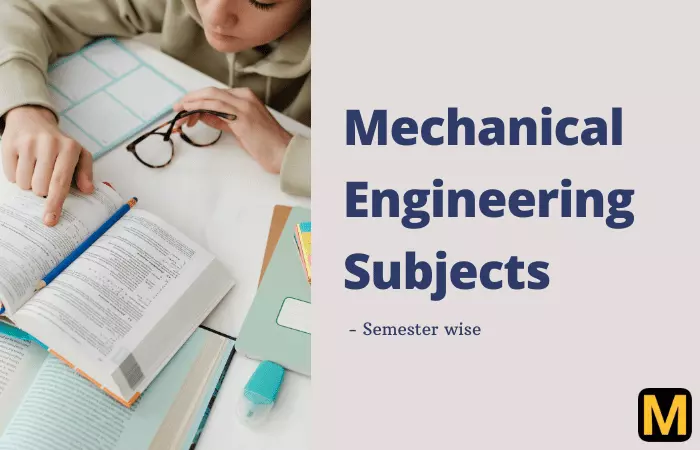Mechanical Engineering Subjects: Everything you need to know
Today at The Mechanical post we’ll discuss about the major/core subjects and courses that you will be learning over the semesters/years during your B.tech or B.E in Mechanical engineering. The names of the subjects may vary from university to university but the content remains almost similar.

We’ve picked up the most common subjects that come under Mechanical Engineering irrespective of the University. You will be learning most of these subjects if not all of them. The Mechanical Engineering subjects are listed yearly as well as semester wise.
Also, we’ve listed the common topics that come under those subjects to give you a better idea about what to expect from that particular subject. At the end of the article you can Download the PDF on the Subjects in Mechanical Engineering.
First year (Semester 1-2)
| Semester 1 | Semester 2 |
|---|---|
| Mathematics I | Mathematics II |
| Engineering Mechanics I | Basic Electrical and Electronics |
| Chemistry | Physics II |
| Engineering Drawing and Graphics | Workshop practice |
| Workshop Practice | Engineering Mechanics II |
| Physics I | Computer Aided Engineering Drawing and Graphics |
| Introduction to Computer Programming and C Language | Environmental Science |
First-year subjects are more or less the same for all branches and they’re quite self-explanatory.
Discover More about What is Mechanical Engineering? Where we discuss about What do Mechanical Engineers do? , Future of Mechanical engineering and much more …
Second year (Semester 3-4)
| Semester 3 | Semester 4 |
|---|---|
| Engineering Mathematics III | Engineering Mathematics IV |
| Strength of Materials (SOM) | Electrical and Electronic Measurements and Instrumentation |
| Measurement and Metrology | Fluid Mechanics |
| Material and Metallurgy | Theory of Machines / Kinematics of Machines |
| Machine Drawing | Solid Mechanics |
| Thermodynamics | Power Plant Engineering |
| Communication Skills | Manufacturing Technology |
3rd Semester:
1. Mathematics III: Partial Differential Equations, Fourier Series, and Probability This course covers advanced topics in calculus, such as partial differential equations, Fourier series, and probability. Students learn to solve mathematical problems related to mechanics and thermodynamics.
2. Strength of Materials: Strength of Materials is a subject in mechanical engineering that deals with the study of the behavior of solid objects subjected to external forces. The subject is used extensively in the design and analysis of various mechanical components and structures, such as beams, columns, shafts, pressure vessels, and machine parts.
3. Measurement and Metrology: Measurement and Metrology is a subject in mechanical engineering that deals with the study of various measurement techniques and instruments like Micrometer Screw-gauge, Vernier Caliper etc.. used for accurate measurement of dimensions, shape, types of errors, and surface texture of engineering components.
4. Thermodynamics: This course covers the principles of thermodynamics and heat transfer. Students learn about the laws of thermodynamics, heat transfer mechanisms, thermodynamic cycles, and power generation.
5. Material Science and Metallurgy: This subject deals with the study of materials, including their properties, structure, and behavior under different conditions. We have a whole section dedicated to this subject in Mechanical Engineering which you can access here.
6. Machine Drawing: Machine Drawing is a subject in mechanical engineering that teaches students how to create detailed technical drawings of machine parts and components using standard drafting techniques. It involves understanding the principles of technical drawing, dimensioning, tolerancing, and assembly drawing of different parts like different types of couplings, knuckle joint, cotter joint etc. The subject is important for engineers involved in the design and manufacturing of machines.
7. Communication Skills: It is a subject in mechanical engineering that aims to develop students’ abilities to communicate effectively in different contexts, including technical writing, presentations, and interpersonal communication in the workplace.
4th Semester
1. Engineering Mathematics IV: It is an advanced subject in mechanical engineering that covers topics such as Fourier series and transforms, partial differential equations, numerical methods, and probability and statistics. It is used in the analysis and design of complex mechanical systems.
2. Kinematics of Machines: This subject deals with the study of motion and geometry of mechanisms, which are used to transmit power and motion in machines.
3. Dynamics of Machines: This subject deals with the study of forces and motions of mechanical systems, including the analysis of the behavior of mechanical systems under different loading conditions.
4. Fluid Mechanics: This course covers the behavior of fluids under external forces. Students learn about fluid properties, fluid dynamics, and applications. This is one of the important field of study in Mechanical Engineering and provides a base for CFD.
5. Mechanics of Solids: This course covers the behavior of solid materials under external forces. Students learn about stress, strain, deformation, and failure of materials.
6. Power Plant Engineering: This subject deals with the study of power generation and distribution systems, including the design and analysis of thermal power plants and nuclear power plants.
7. Manufacturing Technology: This subject deals with the study of various tools, machines, manufacturing processes, including casting, forging, welding, and machining.
Third year (Semester 5-6)
| Name of Subject | Name of Subject |
|---|---|
| Industrial Engineering | Computer-Aided Design and Manufacturing (CAD & CAM) |
| Heat and Mass Transfer | Design of Machine Elements II |
| Design of Machine Elements I | Hydraulics and pneumatics |
| Mechatronics and Control Systems | Refrigeration and Air conditioning (RAC) / HVAC |
| Finite Element analysis | Industrial Management and Entrepreneurship |
| I.C engine & Gas turbines | Industrial Automation |
| Elective I | Elective I |
| Elective II | Elective II |
5th Semester:
1. Industrial Engineering: This subject deals with the optimization of industrial processes and systems, including the study of production planning, scheduling, and inventory management.
2. Heat & Mass Transfer: Heat and Mass Transfer is a mechanical engineering subject that deals with the principles and processes of heat transfer and the movement of mass (such as fluids or gases) across several engineering systems, including concepts such as conduction, convection, and radiation. It is concerned with understanding and analysing the transport of thermal energy and mass inside various mediums as well as across various boundaries.
3. Design of Machine Elements I: This subject deals with the design and analysis of machine components such as gears, bearings, shafts, and couplings.
4. Mechatronics and Control Systems: It is a mechanical engineering subject that combines mechanical system, electronics, and computer control principles to build and construct intelligent systems and machines. It involves the study of sensors, actuators, feedback control, and automation techniques in order to produce precise and efficient mechanical system control for a variety of applications.
5. Finite Element Analysis: This subject deals with the numerical analysis of structural mechanics problems, including stress analysis, heat transfer, and fluid flow.
6. IC Engines & Gas Turbine: It is a subject in mechanical engineering that explores the design, working principles, and performance analysis of internal combustion engines and gas turbines. You’ll learn about the different types of IC Engines and their types, gas turbine power plants their types, how do they operate etc..
What exactly are Elective Subjects?
You might have noticed that here we have mentioned Elective Subjects, so basically, an elective subject, also known as an optional subject, is not mandatory like core subjects. You have the liberty to choose which elective subjects you want to pursue. In case your curriculum demands you to select electives, a list of choices will be provided in your Study Plan.
Some of the popular elective subjects include (again it depends on the college/university you are in):
AI and Machine Learning
Additive Manufacturing
Optimization Methods
Tool Engineering
Robotics
MEMS & Microsystems Technology
Vibrations etc.
The Department of Mechanical Engineeering of MIT (Massachusetts Insititute of Technology) which is one of the top ranked university in the USA offers restricted electives like Fundamentals of Nanoengineering, Optics, Molecular, Cellular, and Tissue Biomechanics, etc.. among others. You can see the list of electives and core subjects offerred by MIT over here.
Whereas, on the other hand Stanford University has a bunch of elective subjects that it offers for its Mechanical Engineering Degree Course, you can check them out over here.
6th Semester:
1. Computer Aided Design and Manufacturing (CAD/CAM): This subject combines the power of computer technology with design and manufacturing processes. It involves using specialized software and tools to create, modify, and optimize 3D models and simulations for product design and development, as well as the utilization of computer-controlled machines for efficient manufacturing and production.
2. Hydraulics and pneumatics: This subject focuses on the study and application of fluid power systems. It focuses into the ideas and techniques of controlling and transmitting power using liquids (hydraulics) and gases (pneumatics), including fluid characteristics, pressure, flow, and control components.
3. Refrigeration and Air conditioning (RAC) /HVAC: It involves controlling temperature, humidity, and air quality for various applications. The subject focuses on designing, analyzing, and optimizing systems that provide cooling, heating, and ventilation in diverse settings such as residential, commercial, and industrial environments. Discover more in depth about What is HVAC and expand your knowledge.
4. Industrial Management and Entrepreneurship: This subject is aimed to equip students with knowledge and skills in managing industrial operations and nurturing entrepreneurial ventures within the mechanical engineering domain. It focuses on developing an understanding of organizational management, strategic planning, leadership, innovation, and the principles of starting and growing a successful mechanical engineering business.
5. Industrial Automation: This subject deals with the study of robotics and their applications in industry, including the design and control of robotic systems. We have a really informative and detailed article on What is Industrial Automation? that will help you in understanding about Industrial Automation.
Fourth year (Semester 7-8)
| Name of Subject | Name of Subject |
|---|---|
| Composite Materials | Automobile Engineering |
| Computational Fluid Dynamics | Supply Chain Management |
| Total Quality Management | Industrial Safety and Environmental Management |
| Renewable Energy Sources | Elective course-I |
| Elective course-I | Elective course-II |
| Elective course-II | Elective course-III |
7th Semester:
1. Composite Materials: This course explores the properties, design, and manufacturing of materials made by combining two or more distinct materials to create a new material with enhanced characteristics. It involves studying the behavior and performance of composite materials in various engineering fields, including aerospace, automotive, and construction.
2. Computational Fluid Dynamics (CFD): Computational Fluid Dynamics (CFD) is a mechanical engineering subject that uses numerical methods and algorithms to simulate and analyse fluid flow and heat transfer phenomena, allowing engineers to optimise designs and solve complex fluid dynamics problems.
3. Total Quality Management (TQM): Total Quality Management (TQM) is a mechanical engineering subject that focuses on strategies and techniques to achieve and maintain high quality in all aspects of the design, manufacturing and operation of mechanical systems. It emphasizes continuous improvement, customer satisfaction and effective management practices to improve product efficiency and overall organizational success.
4. Renewable Energy Sources: This subject investigates the design, analysis and optimization of renewable energy systems to promote the transition to cleaner and more environmentally friendly energy sources.
8th Semester:
1. Automobile Engineering: As we all know this is personally one of my favourite subjects. It consists of various aspects such as car systems, powertrains, vehicle dynamics and safety measures. It combines design principles with automotive technology to create efficient, reliable and innovative transportation solutions.
2. Supply Chain Management: Here you’ll learn about effective management of goods, services and information from the procurement of raw materials to the delivery of the final product to optimize efficiency, cost-effectiveness and sustainability throughout the supply chain network. This involves coordinating various processes such as sourcing, manufacturing, logistics and distribution to ensure smooth operations and meet customer needs, taking into account factors such as inventory management and risk mitigation.
3. Industrial Safety and Environmental Management: This course focuses on ensuring the safety and well-being of workers in industry while addressing the environmental impacts of industrial operations. It is the study of risk analysis, hazard identification, safety protocols and environmental regulations to promote sustainable and responsible industrial operations.
Looking to prepare yourselves for interview after you B.Tech in Mechanical engineering, look no further as we’ve got you covered with our well crafted List of 30 Interview questions for mechanical engineers along with answers and examples.
Conclusion
In summary, the field of mechanical engineering offers a diverse range of subjects covering different aspects of the discipline. From core courses in mathematics, physics and mechanics to special topics such as thermodynamics, machine design and industrial automation, each subject provides valuable knowledge and skills necessary for a career in mechanical engineering.
As a mechanical engineering student, you will learn about fundamental topics such as strength of materials, fluid mechanics, heat transfer and control systems, which are the basis for understanding the behavior of mechanical systems and designing effective solutions. In addition, you will have the opportunity to study options tailored to your interests, such as artificial intelligence, robotics, renewable energy and computational fluid dynamics.
During your academic journey, you will not only gain technical knowledge, but also develop important skills such as communication, problem solving and project management. These skills are critical for success in the professional world of mechanical engineering.
Please note that the above topics may vary slightly depending on the university or college you are studying at. For the most accurate and up-to-date information on the subjects offered in the program, it is always recommended to consult your curriculum or consult with academic advisors.
By diligently studying and mastering these topics, you are well prepared to tackle real engineering challenges, participate in innovative projects, and create a successful career in mechanical engineering.
That’s all about the Different Subjects in Mechanical Engineering (Subject-wise). Also, do share this article with your fellow engineers so that they too can benefit from this.
We’ll be back, until then Keep Learning!



![30 Mechanical Engineering Interview Q&A with examples & [PDF]](https://mechanicalpost.site/wp-content/uploads/2023/07/mechanical-engineering-interview-questions-1-768x512.webp)


![What is Product data management? its importance, advantages & [PDF]](https://mechanicalpost.site/wp-content/uploads/2022/05/Product-data-management-The-Mechanical-post.png)


As a mechanical engineering freshman from California, Just stumbled upon this article while surfing! it can be quite overwhelming to navigate through the different subjects and courses. Having them organized semester-wise as well as yearly with PDF resources is incredibly helpful. Thank you for providing such a comprehensive guide!
Thank you, Sarah! I’m glad you found the article helpful. Our aim while writing this article was to simplify the subject information so that anyone can easily understand it. Best of luck in your academic journey!